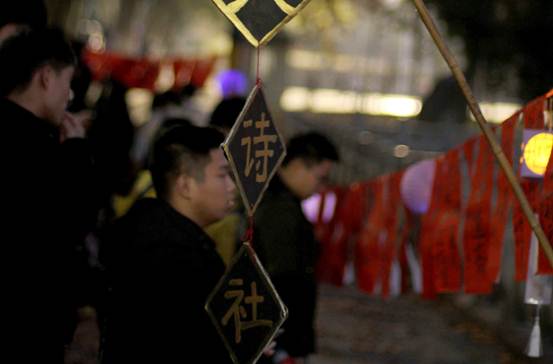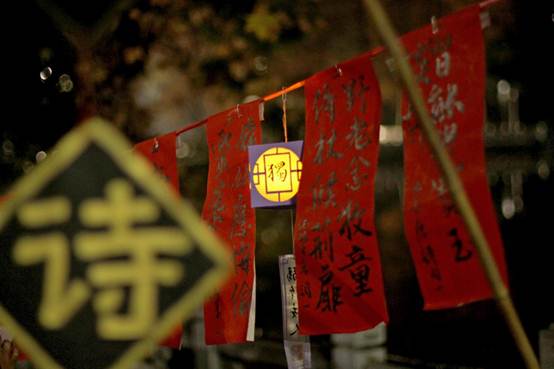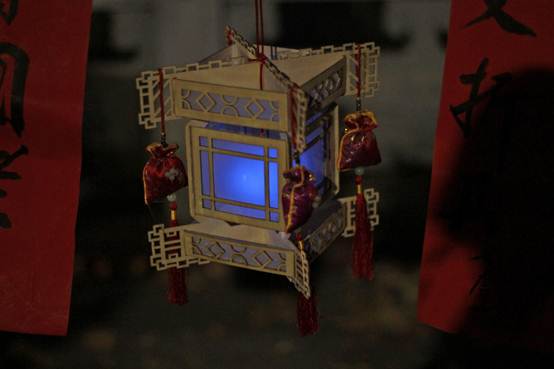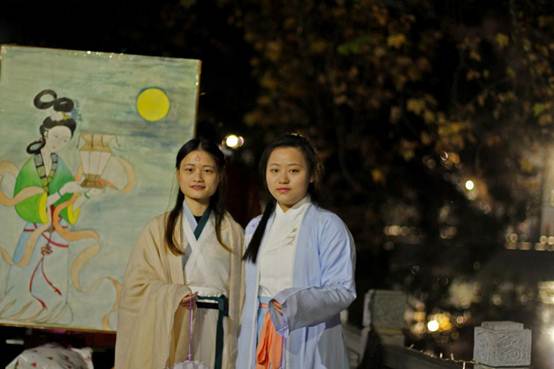On the evening of December 10th, a Lantern Riddle Party was held at Jianhu Lake, where dazzling handmade lanterns and novel riddles were elaborately displayed, attracting numerous students as well as passersby on campus to stay awhile and participate in this extraordinary event.

People deciphering riddles
Fantasy night of lanterns and riddles
The Lantern Riddle, blending both creativity and aesthetics, is one of those mysterious entertainment activities of ancient China that first came about during the Song Dynasty and later became prevalent in the Ming & Qing Dynasties, where riddles of refined words are pasted on lanterns (or on the wall) for literati to decipher. It pertains to paronomasia and generally consists of 3 components: the riddle written on the paper, the category it belongs to, and its answer.

A handmade lantern and some handwritten riddles related to chemistry
This Lantern Riddle Party is one of the hallmark events held by the WHU Chunying Poets Society. Li Xiansheng, a member of the poets society who is an undergraduate of the International School of Software, introduced the process of creating a riddle.
“The first thing you have to conjure up is actually the answer, from which you develop a riddle through brainstorming.” In the ancient times, riddles were usually developed from Confucian classics, history, philosophy and literature; however, this party witnessed modern elements being blended perfectly into this traditional activity. Some riddles were based on scientific terminologies, while others were derived from typical hotspots on campus, and we even found riddles whose answers are terms of the sweeping mobile game Arena of Valor.
“For me, lantern riddle is really an interesting puzzle game which can both intrigue your imagination and help you learn about Chinese culture,” Li shared his reflections on this event with us, “Of course, I made some good friends in the process, and they are different from those you make elsewhere. You know, there are so many activities on campus where students have fun and develop friendship, but I consider this experience a special one, because we developed a good academic atmosphere together and learned a lot about classic Chinese literature. I mean, what we gained is more than ephemeral enjoyment.”

A handmade lantern
The Lantern Riddle Party attracted a great number of participants, many of whom read the whole row of riddles but ended up with nothing. “I’ve began to doubt whether I am actually a Chinese because I could not even work out a single one and could hardly recognize some of the traditional Chinese characters.” Dong Ziyuan, a graduate from School of Economics and Management who was attracted to this party by the delicate lanterns, laughed and cracked a joke, “But still, it’s fascinating and I am totally captivated by these handmade lanterns. They’re just so exquisite.”
Reviving traditional Chinese culture on campus
The Lantern Riddle Party gives us merely a glimpse of Chinese traditional culture on campus. But different student societies and organizations have been founded to let students learn and share knowledge about Chinese traditional culture in WHU.
Take the Chunying Poet Society for example, members not only wrote poems but also took part in some other activities related to Chinese culture. On Friday nights there is a calligraphy class, on Saturday nights members gather to discuss newly written poems and on Sunday there is a lecture about Chinese literature. Members also learn about the art of tea or even make osmanthus-flavored wine by themselves.
“Our poet society is of large scale and you can learn about whatever you’re interested in freely and try whatever you’re intended to challenge,” Gao Jingjing, the president of the Chunying Poet Society from the School of Chinese Language and Literature introduced activities in the society to us, “If you want to participate in more Chinese culture themed activities, we have a good platform.” She was one of those who wore a gorgeous Hanfu (traditional Chinese dress) for the Lantern Riddle Festival. “There isn’t actually a Hanfu Club on campus, but I suppose many members here are fond of the Hanfu and are willing to wear them.”

Students dressed in Hanfu
The rekindling with traditional Chinese culture is reflected in all aspects on campus, including Chinese literature, calligraphy, costume, art and music. In the Guqin Club, members are taught to play this ancient musical instrumental as well as learn about its history. Chinese classical concerts are often held by the Art Department of the Student Union of WHU, with students playing various traditional Chinese instruments.
In the evening of December 12th, a performance named “Poetic Luojia: The Chinese Classics Show”, took place at the student activity center, which consisted of three parts: classical music and poetries, songs in The Dream of Red Mansion, and a recitation of poems written by Luojia School. This grand performance was held to commemorate the 30th anniversary of the TV series The Dream of Red Mansion (1987) as well as provide audience with a pure display of Chinese art and literature from the ancient times to now.
Inheriting traditional culture through various means
Reviving traditional Chinese culture has become prevalent nowadays, with many institutions teaching calligraphy and Chinese classics established and various TV shows related to traditional culture being produced. As a Chinese, we are responsible for inheriting traditional Chinese culture, and it is exactly what many of us are doing. But here in WHU, students may share different opinions towards the inheritance of traditional culture.
Xiao Yifeng from the School of Life Sciences regards culture inheritance as an objective consequence rather than an intentional endeavor. “I find Chinese culture really charming, that makes me so much more willing to gain knowledge about those poems and essays and participate in related activities. I do all these things out of my own interest.”
Gao Jingjing also expressed similar ideas. As the president of the Chunying Poet Society, she admitted that wearing the Hanfu is in a way a good method to advertise the club, but the main reason she wears it is the fact that she finds the Hanfu beautiful and comfortable to wear, which is also her principle when choosing any other piece of common modern clothing to wear. “I don’t regard wearing the Hanfu as a weird behavior and I usually decide whether to wear the Hanfu depending on the weather.” She also tells us why she has chosen to devote herself to the Chunying Poet Society, “Here we can experience a totally different atmosphere of learning Chinese culture, I suppose we are one of the most professional organizations in learning Chinese culture in WHU, which makes it unique compared to other student organizations.
When talking about how to revive the splendid Chinese culture, Wang Chenyang from the School of Journalism and Communication expresses his viewpoint from a different perspective: “Actually I think the number of people who are studying Chinese culture is never too small. The truth is that with the development of the society and rapid pace of globalization, we have so many other choices. Maybe you’re interested in something else rather than Chinese culture so that you pay little attention to how the traditional culture spread from one generation to another, which may give you an impression that we need to advocate traditional Chinese culture more, but it is not necessarily the truth. I think the best way to inherit Chinese culture is to treat it with an unbiased heart.”
Wang Jiahui, majoring in Chinese ancient civilization, expressed her attitude towards learning Chinese culture. “When I first began to learn about it, I saw myself as a person inheriting Chinese culture. But after I learned more about it, I realized that my role is actually someone who studies and researches it. With reviving Chinese culture becoming a new trend, there’re so many people who knows something about Chinese culture, but those who have an expertise in it are still rare.” What’s more, she shows concern for the accuracy in the process of learning. “With so many people wanting to learn about Chinese culture and so many ways they can access information, sometimes it’s hard for new beginners to distinguish whether what they are learning are accurate or not. But from my point of view, especially here in a university, we should learn about Chinese culture systematically and correctly.”
After all, Chinese traditional culture, as splendid and historical as it is, is merely a part of the spectrum of colorful cultures developed by human beings as a whole, but anyway, it is still one of massive significance that has been influencing us so strongly and will continue to do so in the future.
Photo by Cui Wenjing
Edited by Li Yunzhen, Wang Wei, Edmund Wai Man Lai & Hu Sijia